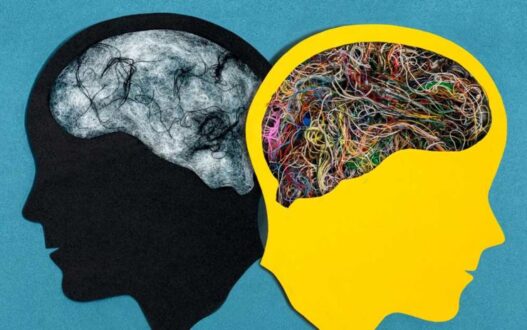 What is Bipolar Disorder?
What is Bipolar Disorder?Bipolar disorder is a psychiatric disorder that falls under the category of mood disorders and causes major mood fluctuations in the patients. Either the person harboring this mental illness is exaggeratedly joyous and happy, or he/she is miserably sad, depressed and hopeless. There is no middle ground; only extremes; two opposing poles as in bipolar.
A person affected by this mental illness will internally face and externally demonstrate two opposing emotional/mental vortexes, and changing behavior and demeanor. Bipolar disorder symptoms can be divided into two; high phase symptoms and low phase symptoms. The high phase consists of two states: Hypomania and Mania1.
The patient suffers through states of mania and hypomania where he/she display the following symptoms:
While the former opposing half was euphoric in nature; the low episodic symptoms also known as the depressive episodes2 are equally miserable as compared to its contradicting pole.
Bipolar I Disorder (mania and depression) – This is the most common and prevalent type of Bipolar disorder, and it’s the most major one. Patients diagnosed with this type of bipolar disorder experience episodes of mania.
Bipolar II Disorder (hypomania and depression) – This version of the bipolar disorder is a softer version of the bipolar disorder I, and it does not consist of mania but comprises of hypomanic episodes. If you have a manic episode, then your diagnosis will be switched to bipolar I disorder.
Cyclothymia (hypomania and mild depression) – This type is a precursor to the real thing but doesn’t pose much of a threat itself; cyclothymia is a more restrained and milder form of the bipolar disorder and consists of cyclic shifts in mood throughout the years. If left unchecked, it can transform into the complete bipolar disorder.
Genetics is indeed a powerful factor and offers a great contribution to this disorder. If there has been a history of bipolar disorder or other similar mental illness in the family, then the chances are that this illness can occur in future generations.
Twin studies have demonstrated the validity of genetics; if one twin harnesses the gene, then there is a 70-80% chance that the other can have the disorder as well.
The surrounding environment can have a huge impact on a person’s mental, emotional and psychological development; a harsh, negligent, or traumatic childhood can trigger manic or depressive episodes. Maybe the environment can itself encourage the gene to active or drug, or alcohol abuse can alter your brain chemistry as well.
The brain’s neurochemistry is another constituent factor in this psychiatric disorder. Research has indicated that there is a connection with neurotransmitters in the brain and abnormal mood swings.
Patients with bipolar disorder also have physical differences in some regions of the brains as compared to those who do not have this illness.
Bipolar disorder treatment involves the following:
Drugs and medication are prescribed depending on the patient’s need; drugs such as anti-depressants, mood stabilizers, and antipsychotics are actually very helpful in balancing neurotransmitters in the brain and producing a calming effect. Although medications have their benefits, they’re not the ultimate cure. It is better to seek professional support like therapy or counseling in the long-run.
Psychotherapy offers a free association technique that allows the patient to pour their heart out with unconditional acceptance and zero judgments. It is a good cathartic opportunity for the patient. Cognitive behavior therapy or CBT can help fight off those negative and nasty thoughts that cripple the patient. The patient can also come up with effective coping mechanisms and various problem-solving strategies with his/her therapist.
IMPORTANT NOTE: The above information is intended to increase awareness of health information and does not suggest treatment or diagnosis. This information is not a substitute for individual medical attention and should not be construed to indicate that use of the drug is safe, appropriate, or effective for you. See your health care professional for medical advice and treatment. Please visit us for best price for prescribed medicines.

Canada Canadian Pharmacy dispenses all medications from licensed and regulated independent pharmacy partners internationally, including but not limited to Australia, Canada, New Zealand, India, Mauritius, Turkey, United States, Singapore and the United Kingdom. All Images on this site are registered trademarks of original manufacturers, international exporters, and property of their respective owners and are for reference only. Canada Pharmacy Online procures all products from licensed regulated international in order to provide you unbeatable lowest prices and prescription discounts for all your prescription medications, medications and Canadian Drugs at Canada Pharmacy Online.
2005-2023 Rxdrugscanada.com